Extended Rulebook
Modded/Custom Card Guide
A seasoned veteran who wants some custom cards from my repo? This first section of the rulebook will get you set up with all you need to know to do just that!
Setup
Setup generally does not change with the exception of adding a couple of new decks to the side. Shuffle the Loot, Treasure, and Monster decks, and set aside space for a discard zone next to each of them. Do the same for the Room deck, if you are playing with it. Put out at least 100¢. Then add the new Familiar Deck and Extras Deck off to the side.
The game starts with 2 shop slots, 2 monster slots, and 1 room slot (if you are playing with the Room deck). These slots should be filled by putting a card from the top of the corresponding deck face up in each. These are the starting shop items, monsters, and room. If any event cards (monster cards without a stat block) are put in monster slots during setup, they should be put on the bottom of the monster deck. Keep going until you have a monster in each slot.
If you are playing with bonus souls, select 3 at random to be the active bonus souls for the game. Place them face up next to the play area.
Deal a random character card and matching starting item card to each player. Characters start the game deactivated (turned sideways). Starting items start the game charged (turned upright).
Deal 3 loot cards (face down) and 3¢ to each player.
Finally, you must decide on the starting player: the saddest player goes first! You can also each roll a dice (lowest roll goes first!) or use any other fair method of randomization, if you are all equally sad. The game then starts, with the starting player taking the first turn.

Card Types
Familiar Cards
The Familiar Deck holds familiars that can help the player on thier conquest to get Four Souls. This deck is generally not used in game unless a monster who has a familiar version is killed. These are usually Non-Boss Void Monsters or Pokemon. While you control a Non-Boss Void Monster or Pokemon, you also have control over thier familiar version.
When a Non-Boss Void Monster or Pokemon is killed the active Players must search the deck and add the familiar of the monster they killed to thier 'team' (For more information see Familiars).

Extras Cards
The Extras (Outside) Deck holds a large variety of cards that can help or hinder the player on thier conquest to get Four Souls. The important thing about the extras deck is that it is generally not utilized in game unless a card specifies to search the 'extras'.
The deck contains a large variety of different card types. The deck may contain Items, Monsters, Familiars, Events in Play, Loot, or State Cards. Cards in the Extras Deck are public knowledge and any player may look at it, at any time.

Noble Six Cards (Arsenal Deck)
This deck is only utilized by the character card: "Noble Six". This deck consists of cards that can played or influenced by Noble Six's starting items, "Legend's End" and "Hyper-Lethal". Cards in this deck can be found as normal loot cards as well in the loot deck.
Cards from the Arsenal Deck are considered Loot Cards, only for the purpose of effects that cancel loot cards. When cancelled, your arsenal cards are shuffled back into your arsenal deck. When successfully used put the card at the bottom of the deck.

Souls
New Soul
There is a new way to get souls when playing with the void modded set. There are an "unlimited" number of copies of the "Soul of the Void". So in theory one could win by only killing void monsters.
For every 2 Non-Boss Void Monsters a player currently controls, they gain a copy of the soul. So if a player currently controls 4 Non-Boss Void Monsters, they would have gained the "Soul of the Void" twice. Once gained, they act like any other soul.
If a player for any reason is forced to discard a Non-Boss Void monster, then they also would lose the "Soul of the Void" if thier controlled Non-Boss Void Moonsters amount would decrease from 2 to 1.
Monster Familiars & Attacking
When a player declares an attack, before they choose what to attack, priority passes. Before a player chooses to attack, if they have any familiars on thier team, they may choose a familiar and choose what to attack with the familiar, then priority passes after. This counts as one of your attacks for the turn. Familiars are considered active when attacking.
While familiars are active, they are considered players for the purposes of items, loot cards, and monster effects that target players. At the end of each turn, all familiars fully heal.
Your items are not considered "controlled" by the familiar. For example, synthoil wouldn't give +1 to rolls to the familiar, items like Blood Lust could target the familiar to increase its damage for the turn.
Items like Champion Belt would only affect the active player. Only the player may attack an additional time not the familiar. So it would be wise to attack first with a familiar and then attack additional time with your character because the familiar cannot attack an addtional time.
If your familiar dies, you may pay its death penalty and end the attack. If you decide not to or can't pay the familiar's penalties, the attack ends and the familiar is put back in the familiar deck and you lose control of the Non-Boss Void monster by discarding it.
When you die while attacking with your familiar, cancel the attack, pay death penalties and end your turn.
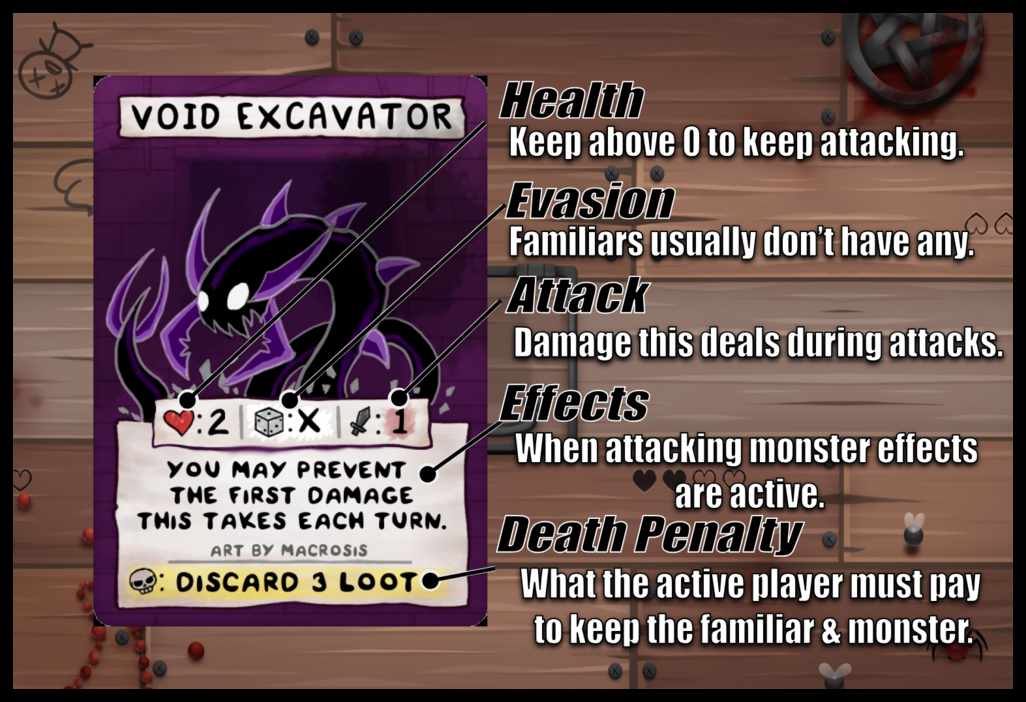
Pokemon Monsters and Monster Familiars
Pokemon are a diiferent sub type of moddded/custom card in Kire's Four Soul Card repo. They are different in that they have new info on how they interact with other pokemon type cards and how thier familiars work.
While pokemon can be monsters or monster familiars they have a new mechanic: typings. Pokemon have their own typings that they identify with as well as a weakness typing. When a pokemon is hit or dealt damage by a pokemon type of their weakness, they take one additional damage.
While your items are not considered "controlled" by a regular familiar, a Pokemon familiar considers your items as affecting them. For example, synthoil wouldn't give +1 to rolls to a regular familiar, but it does to Pokemon Familiars
Items like Champion Belt would also affect the active player and familiar. The player or familiar may attack an additional time... So in this case it wouldn't matter who attacks first.
Due to Pokemon Familiars being affected by your items and being a stronger familiar then regular monster familiar, The pokemon monster need to be captured. They have a set amount of Capture Attempts before they are discarded after death and a Capture Rate which is the number the player must roll to capture the pokemon monster and gain its familiar.
Pokemon Monsters that have souls are usually Trainers with Pokemon who are not able to be captured.
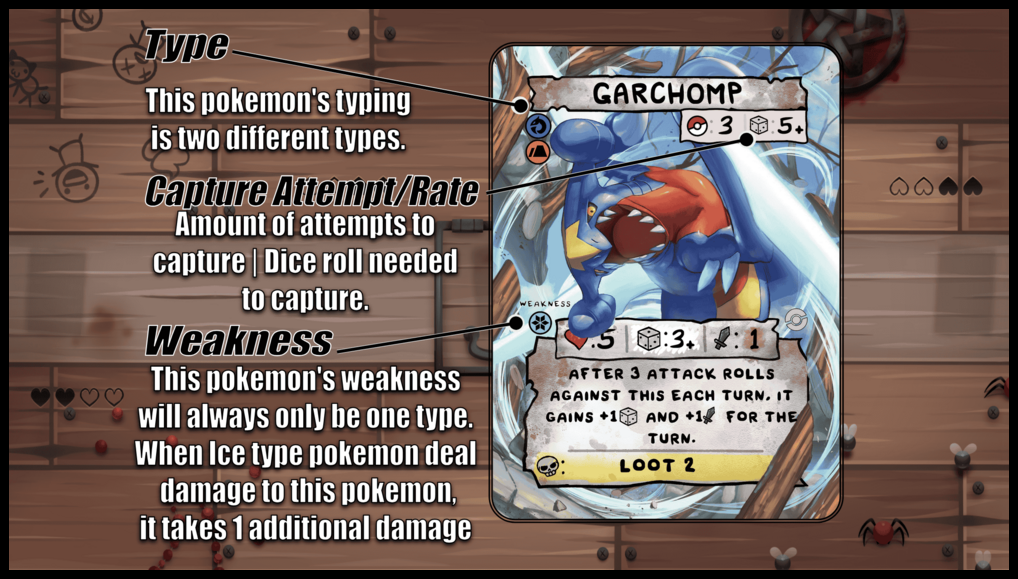

Companions
New Addition to the Monster Deck!
These cards exist within only the monster deck and are strong game pieces that are also easy to lose.
If revealed from the top of the monster deck when attacking it, it takes up an attack for the turn. When these enter play by being put in an active slot, the active player gains it/them as an item, and they are treated as a treasure cards as long as they are in play.
When a player dies, before they pay death panalties, all their companions are destroyed and put in the monster discard pile.
States
The switch keyword is to indicate changing a card to a different state (Switching to 2 means changing to state 2.)
Starting an attack against a different state of a monster still counts as initiating an attack, so items like Bob's Brain would trigger each time. Revealing the new state of an item does not count as gaining a new item.
You may look at a card's different states at any time.
When switching a card's state, unless specified:
- Counters are not removed, niether is anything noted on the card.
- They keep the same status of charged/deactivated (A deactivated card switching to a different state does not recharge it.)
- HP is set to the new State's Max HP.
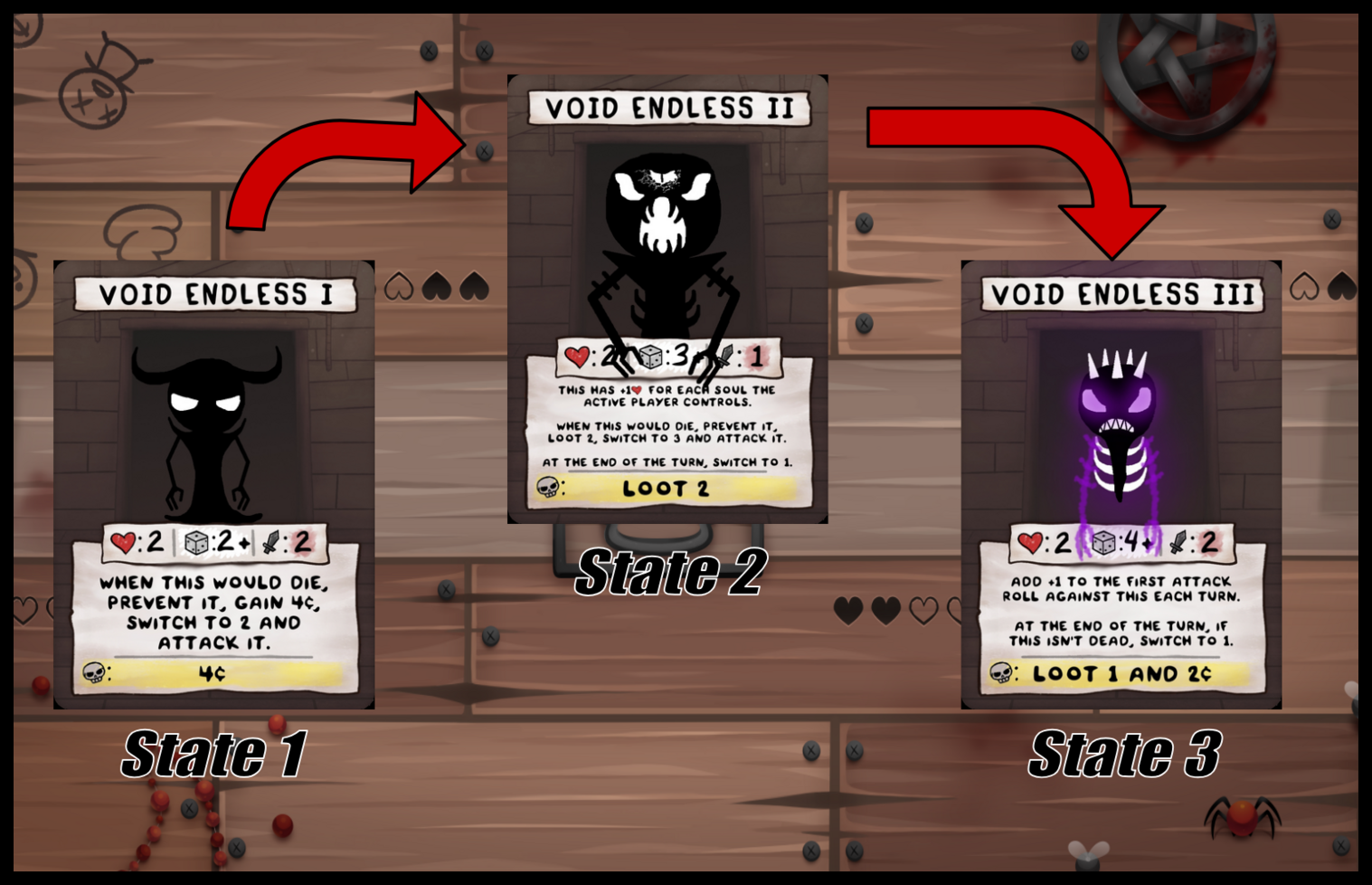
Ranked Monsters
Ranked Monsters each have 4 states, 1 for each of the possible soul counts (0-3 and 3 onwards).
The state of all ranked monsters is always equal to the amount of souls the active player has +1. For example: If the player has 2 souls, the ranked monster is at state 3.
If the active player's soul count changes during an attack, the rank only changes at the end of the attack.
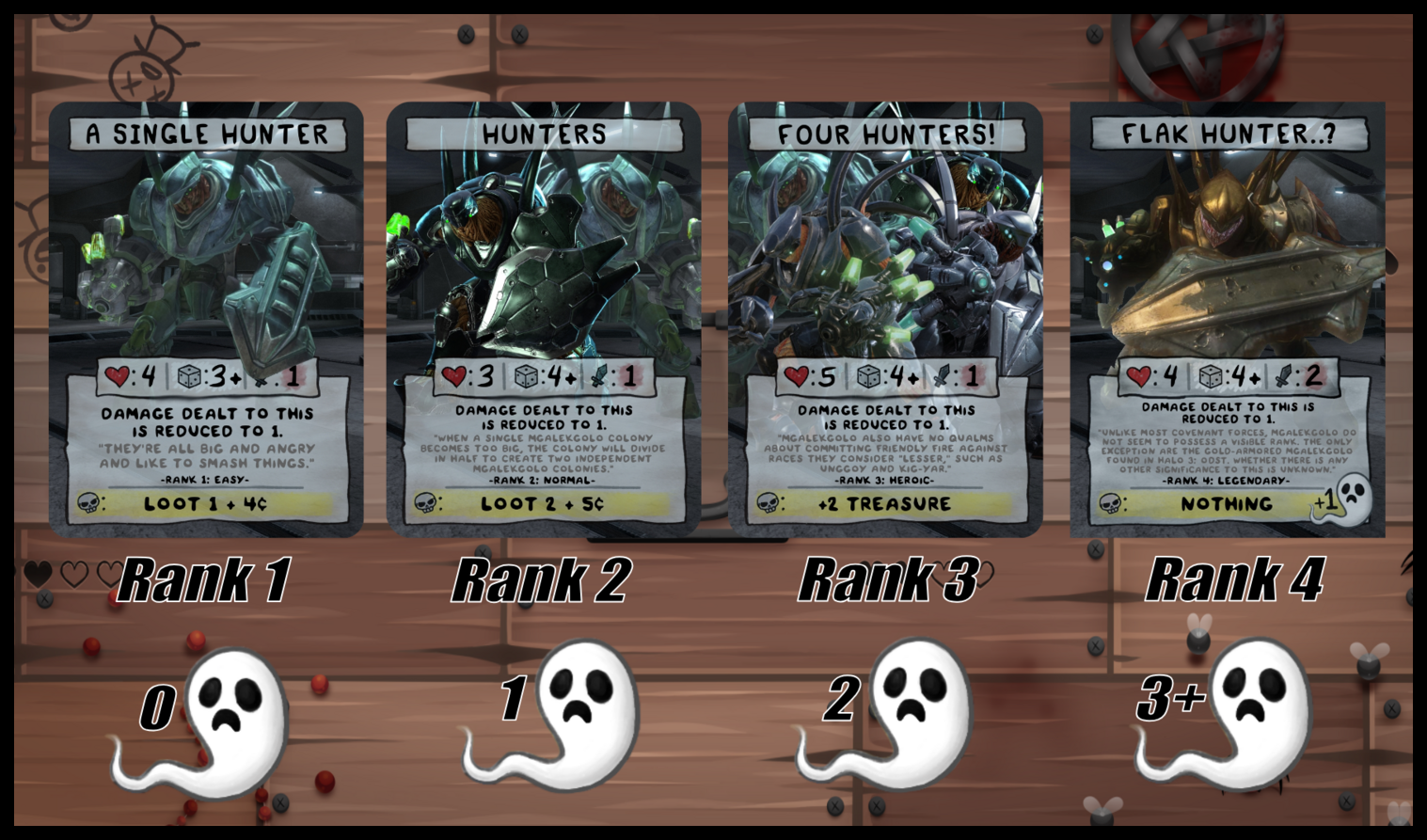
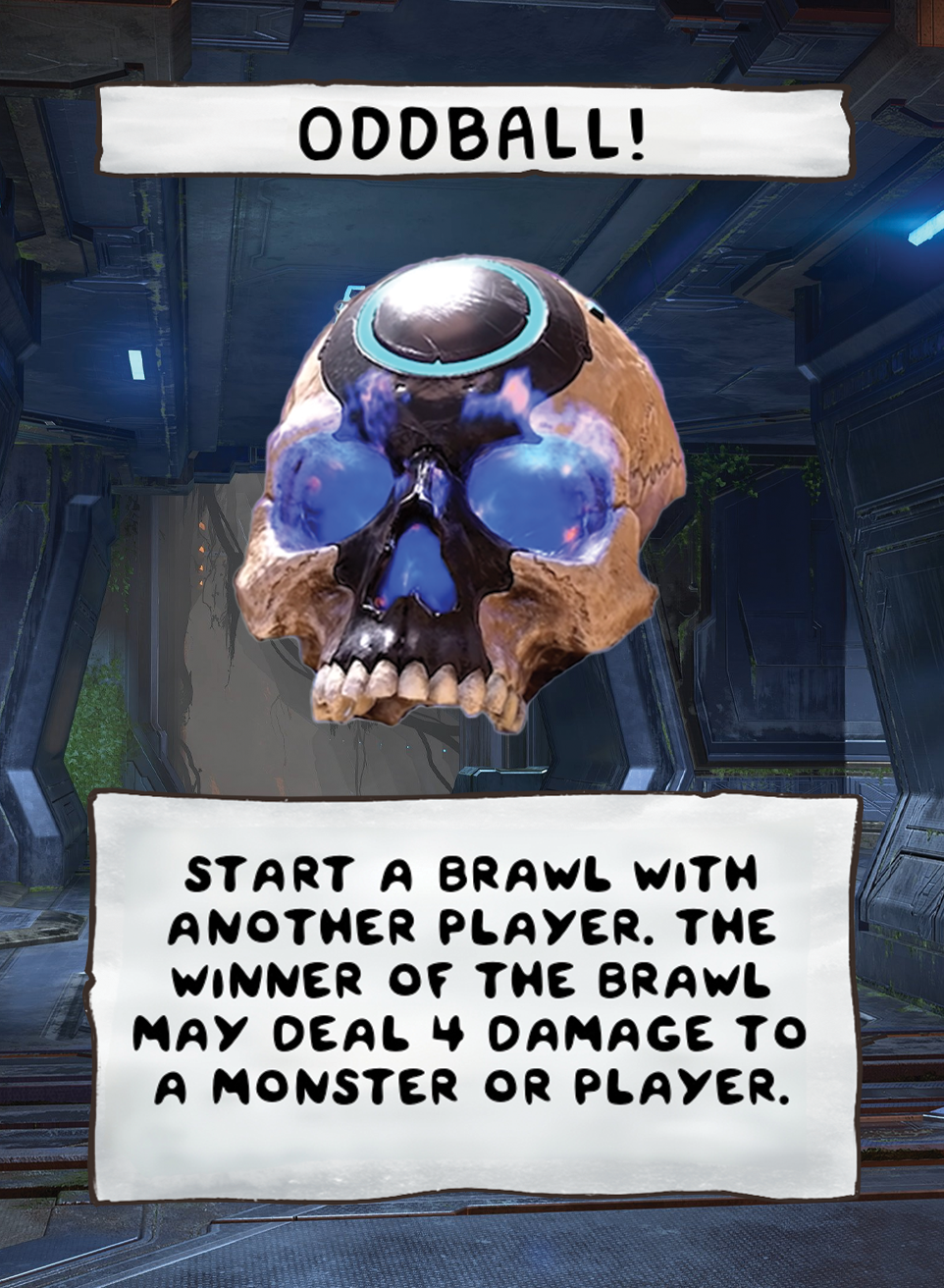
Brawls
New pvp feature to the game.
Certain cards will prompt you to start a brawl, an alternative sort of attack against one another. Some will indicate that you have the option to bow out (choose not to participate.), but others will force all players by default.
In a brawl, all participating players roll: These rolls are considered attack rolls and can be modified accordingly. The player(s) who roll the highest deal damage to the player(s) who rolled the lowest. Players take damage and dies as normal, though players who die in this manner don't have to destroy an item.
If players roll the same number, they all rolled the highest and lowest so all players damage each other.
Afterwards, the remaining players roll again, and the cycle continues until only one player is left, who then recieves some sort of rewards. If the brawl ends with multiple killing each other, the first among them in turn order is the winner.
If all players except 1 bow out of a brawl that player wins by default.
Brawls cannot be started during combat, and monster familiars cannot be part of brawls.
Key Terms
Peek
Certain cards will feature the phrase "Peek at X of Y Decks". Treat this as a shorthand version of "Look at the top X cards of y decks. Put any amount of them on the bottom of their decks, then put the rest in any order."
Non-Lethal Damage
Non-Lethal Damage is damage that cannot lower HP below 1. Taking non-lethal damage, even if it doesn't lower the target's HP, counts as taking an instance of damage.
Charge Counters
When a Charge Counter is on a card, the player who controls that card may remove 1 charge counter from it to trigger one of its arrow effects.
Money Cards
Money loot cards are loot cards that unconditionally grant you ¢, even if it's 0¢.
Initial Combat
"On intial combat" is simply shorthand for "the first time each turn either an attack roll would be made against this or an attack would be started against this."
As your turn starts
Abilities that are triggered with "As your turn starts" or "As your turn begins" happen at the very beginning of a turn, before anything else.
Standard Reward(s)
A card referring to a monster's standard rewards refer to all cents, loot and treasure that monster awards upon death. (Souls do not count.)
Nullify
When a target is nullified they lose all abilities except eternal for the duration of the effect.
Free
This loot card can be played without using a loot play.
Banish
Remove this from the game.
Fragile
When you die, before paying penalties, destroy this.
Keyworded Abilities
Companion
When this card enters play, the active player gains this as an item. When you die destroy this.
External
When this card would be put into an active slot, instead put it into a new slot. This card can't be covered.
Bonus
When revealed from attacking the top of the monster deck, you may attack an additional time.
Void Familiar
Indicates that despite the card type it can also be used to attack like familiar
Optional
When a card is put in an active slot from attacking the top of the monster deck, you may cancel your attack. If you do, you may attack an additional time this turn.
Unattackable
This can't be attacked. If you put this in an active slot by attacking the top of the monster deck, you may attack an additional time this turn.
Fragile
When you die, before paying death penalties, destroy this.
Summon
At the end of each turn, put all summon monsters back to the extras pile.
Rank
Ranked monster states scale to the amount of souls the active play has. Rank = Souls +1. EX: 2 Souls: Rank 3.
Next
Extended Rulebook
